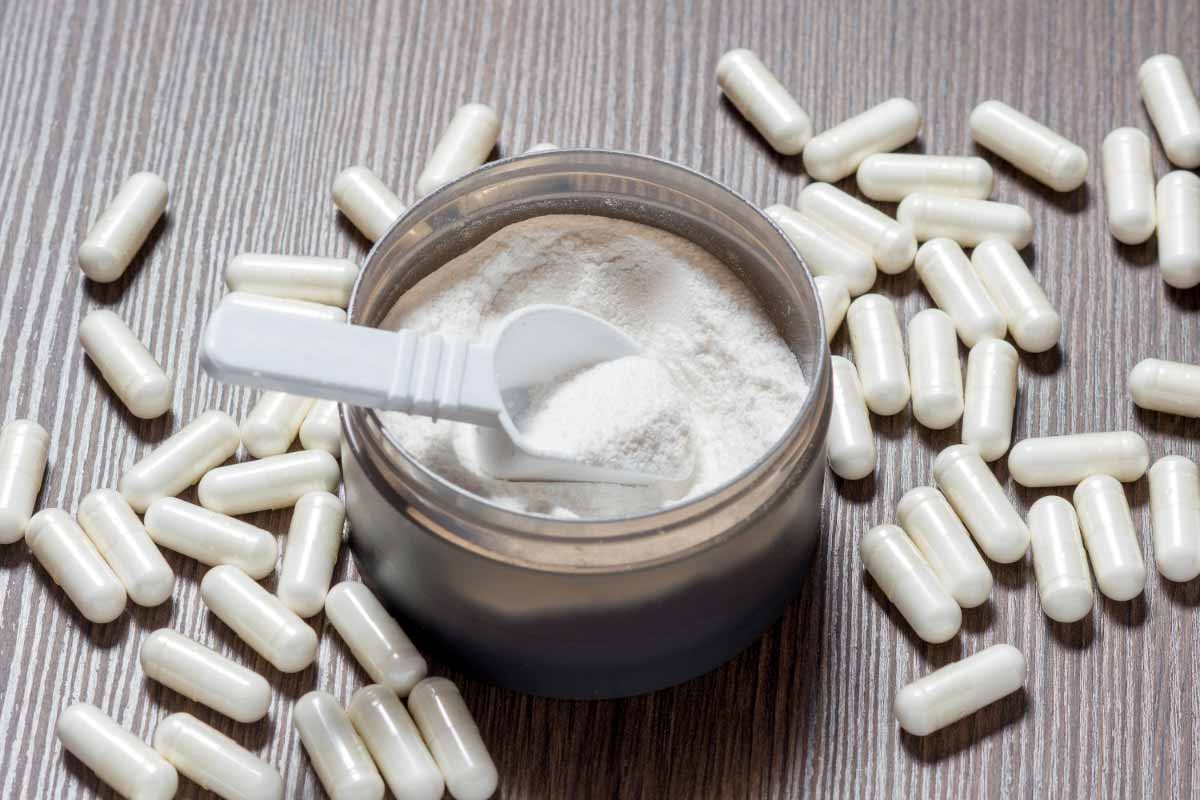Creatine is the most popular, and safest, supplement for improving both performance in the gym and increasing quality of life.
Hundreds of studies show that without a doubt, creatine can increase muscle mass, strength and protect against aging and its associated diseases (1, 2).
Best Creatine
1. Transparent Labs Creatine HMB
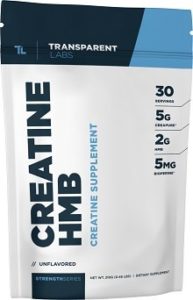
While Transparent Labs is one of the most well-known companies in the supplement industry, its creatine HMB product is by far one of the most successful. HMB is a metabolite that prevents the breakdown of muscle protein. There is a significant amount of scientific evidence to suggest that HMB is highly effective in its role of muscle protection, making it an ideal addition to creatine powder.
Though this is certainly a definitive reason to have Transparent Labs at the top of our list, their purity of product and potency also surpass almost every supplement option available. For these reasons, it’s our #1 pick.
2. Optimum Nutrition Micronized Creatine
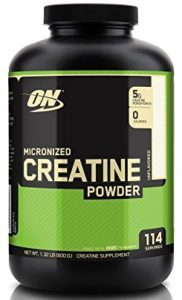
As a micronized creatine supplement, Optimum Nutrition is a great addition for those who may have hit a plateau in their weight loss or workout goals.
Additionally, the purity of this product cannot be disputed. Made with CreaPure Creatine, there will be very few creatine supplements that can stand next to it successfully. This supplement contains no fillers, additives, sugars, flavors and is certified keto-friendly.
3. BulkSupplements Pure Micronized Creatine
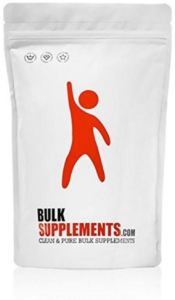
This creatine powder is free of any allergens such as soy, gluten, wheat, eggs, or dairy making it a great choice for those who may have a sensitivity to certain allergens. It is also vegan-friendly and sugar-free increasing its potency and suitability for multiple lifestyles.
The only drawback for this specific supplement can be found in the company’s choice of packaging. While many creatine supplements come in containers, BulkSupplements opts for a resealable bag.
4. MuscleTech Platinum Creatine
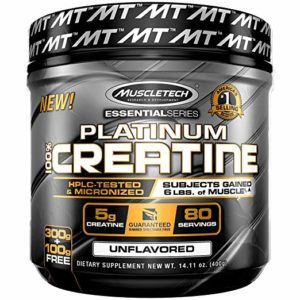
For those looking for a 100% creatine powder, MuscleTech may have just what you need. This creatine powder gives you a pure creatine choice that pairs well with almost any beverage you want to mix it with. Since it’s unflavored, it eliminates the concern of added sugars or flavors, often found in other popular creatine supplements.
The amount of creatine powder you get with MuscleTech is also something to take note of. With an 80-serving container, there will be very little chance of running out and needing to restock during the crucial loading phase of creatine use.
5. Crazy Muscle Three-atine
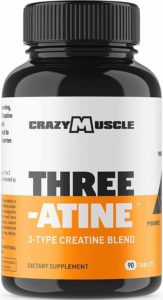
Crazy Muscle is made of three different creatine formations: creatine monohydrate, creatine alpha-ketoglutarate, and creatine pyruvate. This makes it a key player in faster recovery times following a workout.
Aside from the innovative approach to addressing the creatine needs of their customers, their capsule option provides a more convenient way to take supplements than traditional powder forms.
6. Raw Barrell’s Pure Creatine Powder
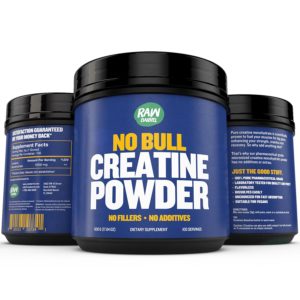
Raw Barrell touts a 100% creatine product free of fillers, additives, or any common allergens. With the company’s commitment to its customers and the quality of the product itself, there is very little to be unhappy with concerning this supplement.
One thing that made this product interesting was its commitment to education. While other creatine products assume their users know about the product and the supplement, Raw Barrell provides a digital guide for users.
7. MP Essentials Micronized Creatine
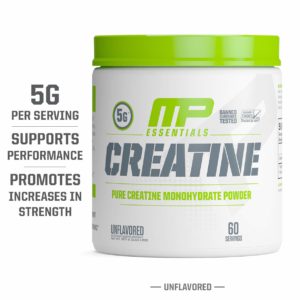
As one of the highest-rated creatine supplements by consumers, MP Essentials Micronized Creatine lives up to its brand reputation.
It provides a high-quality creatine supplement that’s free of anything that is not natural or organic. It also has a banned -substance testing badge of approval. Those looking for a product to try at minimal cost will find this to be a good introduction to the world of creatine supplementation.
8. Nutricost Micronized Creatine
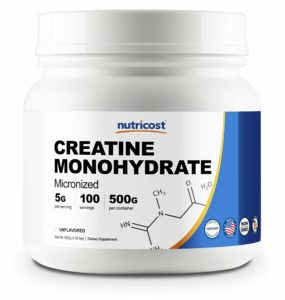
Nutricost Micronized Creatine is a high-quality brand with those who may just want to try creatine without having a significant price tag attached.
The 500g container costs a fraction of other brands and has no additional ingredients or fillers included. Additionally, it is both paleo and vegan free allowing those with more unique lifestyles to use it as well.
9. NOW Sports Nutrition Creatine
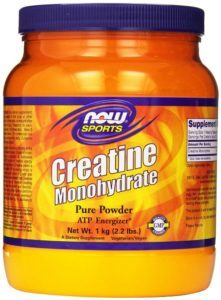
Though it is a pure creatine product with no additional ingredients or fillers, it also brings with it completed testing for banned substances by a globally recognized agency.
NOW Sports Nutrition Creatine provides all of the common benefits found in creatine, and its informed-sport certification makes this a great investment for those in the sports world.
10. BEAST Sports Nutrition
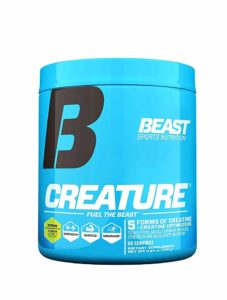
Though this is one of the lesser-known brands of creatine, Beast Sports Nutrition provides a wide array of choices for more novice creatine users.
They provide options of various flavors, including an unflavored option and those that are flavored contain all-natural ingredients to further improve their quality.
How We Rank
With creatine being one of the well-known and popular supplements available, the choice of which was the best was not easy. To start, we chose to review which supplements stayed true to scientific proof and evidence. Previous studies have shown that creatine supplements should be taken in high, consecutive doses during the initial loading phase. With this in mind, we rewarded supplements and brands, like Optimum Nutrition, that make this an easier task, rather than companies who provided smaller serving sizes.
The purity of the products we chose to list was also of significant importance. Brands such as BulkSupplements or Transparent Labs were placed in higher positions because of their commitment to manufacturing some of the cleanest supplement choices available on the market. Those that did not have creatine as the main ingredient or had fillers were not included in our group.
Another prime element we considered was the delivery method. While there are multiple methods used to deliver creatine, powder-based supplements had a definitive advantage over those in pill or capsule form; which is why you’ll find many of the brands we ranked, like Muscletech, Beast, and NutriCost are all powder form. Though this is due largely in part to easier dosage, capsule forms tended to lack the purity level discussed previously.
Lastly, the ingredient list for each supplement was taken into thorough consideration as well. We wanted to place a high emphasis on products that were free from common allergens and had certification status to ensure superior manufacturing quality. While our list is devoid of some brands such as GNC, it is designed to make sure you get the best quality supplements while ensuring good results and affordability.
Benefits
1. Creatine provides explosive energy. One study in 2003 demonstrated that creatine works to increase phosphocreatine stores in your muscle tissues (3).
This energy transfer pathway provides large amounts of energy for very short duration physical activity, such as snatching a barbell or starting a sprint.
2. Creatine can help you gain lean muscle mass. One study in 2000 examined 23 men over the course of six weeks to determine the effects of creatine supplementation.
After 6 weeks of training, the group with creatine supplementation during arm flexor strength training lead to greater increases in arm flexor muscular strength, upper arm muscle area, and fat-free mass than strength training alone (4).
Another study (1999) showed that creatine supplementation in combination with weight training almost tripled the amount of muscle fiber growth compared to just weight training alone over 12 weeks of use (5).
A large meta-analysis done in 1985 examined 250 supplements to determine their effects on muscle growth. The study found the creatine was the single most effective natural supplement for adding muscle mass (6).
3. Creatine enhances cell signaling. Supplementing with creatine is seen to increase your levels of satellite cell activity so that nearby muscle tissues will help with repair and commence new muscle growth.
However, it is not done on its own. A study published in the International Journal of Sports Medicine showed that creatine supplementation in combination with resistance exercise was needed to increase cell signaling (7).
Without exercise, the creatine exerted no enhanced signaling within the cells.
4. Creatine raises your levels of anabolic hormones. Research illustrates that while supplementing with creatine, you will see a significant rise in anabolic hormones, such as IGF-1 that leads to faster muscle growth. (8)
One study published in 2005 showed that creatine supplementation increased the expression of growth factors and the phosphorylation of anabolic signaling molecules (9)
5. Creatine significantly boosts cell hydration. 2 studies (1993 & 2010) demonstrated that creatine not only enhances cell hydration but also stretches the muscle cells which helps with repair and growth (10, 11).
6. Creatine can reduce protein breakdown. A 2001 study published in the Journal of Applied Physiology showed that muscle cell breakdown is significantly reduced with creatine supplementation (12).
7. Creatine lowers levels of myostatin. Myostatin is a catabolic regulator of skeletal muscle mass – meaning it is responsible for slowing down- or blocking- new muscle growth. A study in 2010 showed that creatine supplementation can directly lower myostatin levels and as a result significantly increase muscle growth potential (13).
8. Creatine is shown to enhance muscle growth over the short and the long-term. Interestingly enough, creatine can increase muscle gain in sedentary, elderly, and athletic populations (14, 15, 16).
In the elderly, one study (2003) over 14 weeks showed that adding creatine to resistance exercise significantly increased both leg strength and muscle mass (17).
Another 14-week study of the elderly found that adding creatine to a weight training program significantly increased leg strength and muscle mass (18).
In athletic populations, a 12-week study published in the Journal of Applied Physiology showed that creatine supplementation increased muscle growth two to three times greater than weight training alone. The increase in lean body mass doubled as well as the one-rep max for the subjects’ bench presses (19).
A meta-analysis compared the evidence of the most popular supplements available and discovered that creatine is the most effective supplement for adding muscle mass (20).
Fortunately, taking creatine for as little as one week is seen to boost your lean body mass and muscle size significantly.
Specifically, one study consisting of a six-week training program showed an increase of 4.4 lb. During creatine supplementation compared to subjects who didn’t take creatine (21).
9. Creatine supplements can help lower blood sugar levels. Scientists hypothesize that creatine improves the efficiency of GLUT4, a protein that brings blood sugar into the muscle tissues (22, 23).
One 12 week study in 2008 showed the effect of creatine on blood sugar levels after a high-carb meal (24).
The positive response in short-term blood sugar response to a meal is highly correlated to the risk of developing type 2 diabetes, showing that creatine supplementation can reduce the risk of type 2 diabetes in subjects.
Combining creatine and exercise produce even greater control of blood sugar levels compared to exercise alone (25).
10. Creatine improves both strength and performance in exercise. A review of the research shows that adding creatine to training programs increases key performance factors.
Specifically, strength was increased by 8%, weightlifting performance by 14% and bench press one-rep max by up to 43%, compared to the results from training alone (26).
The effects are similar in well-trained athletes as well. One study in 1995 looked at a 28-day training protocol to increase bike sprinting. Creatine increased performance in the sprinting by 15% and bench press performance by 6% (27).
Creatine is also beneficial during when athletes push the boundary into overtraining because one study showed that during intense over-training blocks strength, performance, and muscle mass were either maintained or increased (28).
11. Supplementing with creatine increases phosphocreatine levels in the brain. Like muscle tissue, the brain requires plenty of ATP to work (29).
Supplementation with creatine has been suggested to improve Alzheimer’s disease, Parkinson’s disease, Huntington’s disease, ischemic stroke, epilepsy, brain or spinal cord injuries, motor neuron disease, and memory and brain function in the elderly (30, 31, 32, 33, 34, 35, 36, 37, 38).
Although there is an arsenal of research showing the potential of creatine to treat neurological disease, most of this research is confined to animal studies.
One human study in 2008 showed that during six months of creatine supplementation with children who had a traumatic brain injury, resulted in a 70% reduction in fatigue and 50% reduction in dizziness (39).
In the general population, creatine supplementation mainly benefits the elderly, vegetarians, and those at risk for neurological diseases (40, 41).
Vegetarians react positively to creatine because they have a lower dietary intake of creatine.
One 2003 study examining vegetarians showed that those who supplemented with creatine saw a 50% increase in memory and 20% improvement in intelligence based on testing (42).
Unfortunately, the effect of creatine in increasing brain function in those not low in creatine is not significant (43).
In addition, mice with Huntington’s disease given creatine showed 72% of their brain’s phosphocreatine pre-disease levels compared to the mice in the control that only saw 26% of their brain’s phosphocreatine recovered (44).
12. Creatine has been shown to have beneficial effects on Parkinson’s. Parkinson’s disease is caused by a reduction in brain levels of dopamine that leads to brain cell death as well as several symptoms including tremors, loss of muscle function and speech impairments (45).
In mice, creatine is seen to prevent 90% of the drop in dopamine levels seen in Parkinson’s (46).
A conventional treatment approach for Parkinson’s is to promote weight training to negate the loss of motor control.
Studies in humans show that combining creatine with resistance training improved strength and daily function significantly more than training alone (47).
13. Creatine supplements may also reduce fatigue and tiredness. One of the most extensive studies on energy and creatine followed brain injury patients over six months. Patients that supplemented saw a 50% reduction in dizziness compared to the control group (48, 49).
Additionally, only 10% of the patients suffered from fatigue, or low energy, compared to 80% of the subjects in the control group (50).
A similar study showed that creatine reduced fatigue during sleep deprivation (51).
In athletes, creatine is seen to reduce exercise-induced fatigue during a cycling test and in high heat (52, 53).
14. Creatine can reduce muscle cramping. Contrary to popular belief creatine can actually have protective effects against muscle cramping. In one study it showed that creatine actually reduced the likeliness of muscle cramps by 60% (54).
15. Creatine can improve cognitive functioning in normal adults. One of the primary elements for successful brain function in the human body is a constant energy supply. This ensures the proper functioning and cognitive abilities. When energy supplies are impaired or depleted, brain function could be detrimentally affected, or even lead to neurodegenerative diseases. The use of creatine, however, can replenish ATP in the body and boost energy levels needed for proper brain function.
In several studies, creatine has demonstrated the ability to not only improve the ability to retain information but also help to prevent many psychological disorders including Parkinson’s and dementia. As creatine concentrates in the brain, supplementation ensures that the stores needed for proper human use do not become depleted through use during other functions (55).
Though there have been multiple positive studies showing the benefits of creatine in terms of cognitive function, there are still more needed to conclude whether or not long term or short term use is more effective. Overall, however, this is positive information for those hoping to boost their brain functionality.
Side Effects
1. Creatine can cause temporary IBS (Irritable Bowel Syndrome) like symptoms. While being generally safe, a few side effects pop up from time to time including upset stomach, abdominal pain, diarrhea, and weight gain (56).
2. In very high, long-term doses, creatine can cause kidney damage. Creatine may also react negatively with caffeine and certain medications.
3. Creatine is not regulated or evaluated by the Food and Drug Administration (FDA). Creatine, like any supplement, can be processed and contaminated with other potentially dangerous supplements. Always confirm that you’re buying your creatine from a reputable company, ideally with third-party certifications.
4. Creatine causes weight gain. After 1 week of creatine loading (20 grams/day), weight can increase by around 1-3kg. This is a result of increased water in the muscle tissue (57).
After about 2 weeks, the water retention usually disappears, and any left overweight is almost always extra muscle mass.
5. Creatine can interfere with certain medications. You may also wish to avoid creatine supplements if you are taking any medications that affect liver or kidney function.
Such medications may include cyclosporine, aminoglycosides, gentamicin, tobramycin, anti-inflammatory drugs like ibuprofen and numerous others (58).
Creatine can help improve blood sugar management, so if you are using medication known to affect blood sugar, you should discuss creatine use with a doctor (59).
6. Creatine can increase the likelihood of Rhabdomyolysis. Rhabdomyolysis is a condition where muscle breaks down and leaks harmful proteins, is also said to increase with creatine. This myth originated because a marker in the blood called creatine kinase increases with creatine supplements (60).
However, this slight increase is quite different from the copious amounts of creatine kinase associated with rhabdomyolysis. Interestingly, some experts even suggest creatine may be protective against this condition (61, 62).
Despite all this, the International Society of Sports Nutrition regards creatine as extremely safe and concludes it is one of the most beneficial sports supplements available (63).
One study investigated 52 health markers, taking blood samples before and after 21 months of creatine supplementation. They found no adverse effects (64).
7. Creatine can cause liver damage. While there has been some evidence to suggest that liver damage is not prevalent with creatine use, there are those who should be cautious when beginning a creatine supplementation regimen. Creatine is an amino acid produced by the liver, kidneys, and pancreas. This production has a profound effect on supplementation in the human body.
Generally, creatine is considered fairly safe for those taking it in low dosage amounts over a short time. A study conducted in 2005, concluded that significant inflammation and lesions were present following long-term creatine usage. As the human body may become increasingly dependent on the use of supplements, long-term dosage may begin to alter its processing and reaction to creatine in general (65).
Additionally, those with a history of liver disease should avoid the use of creatine supplements. Once the liver disease has been identified, the human body’s natural ability to produce creatine is greatly decreased. Taking creatine supplements may only serve to inhibit the liver’s ability to both produce and process creatine.
8. Creatine can cause allergic reactions. While creatine naturally occurs within the body, there is still the possibility of allergic reactions during the use of supplements. The reactions generated from the use of supplements can have many causes, but they are usually primarily linked to ingredients within the supplement rather than creatine directly.
Allergic reactions to creatine could manifest in the form of a skin allergy or possibly even difficulty breathing. In most cases, allergies to creatine supplements appear to be moderate and usually appear in the form of hives or rashes that may be raised and itchy. These allergic reactions can usually be resolved through the use of antihistamines or cold compresses.
In some cases, however, an allergic reaction to creatine may result in the presence of anaphylaxis. Anaphylaxis is a life-threatening allergic reaction that is characterized by facial, tongue, or throat swelling in conjunction with difficulty breathing and, in some cases, death. Allergic reactions of this magnitude can only be resolved through immediate medical intervention.
Though the instances of creatine allergy are rare, it is still important to be mindful of any adverse reactions or effects that may occur. If you have a history of severe allergic reactions or have experienced a reaction while using creatine, it is recommended that you contact an allergist or physician before beginning routine or regular creatine supplementation.
Recommended Dosage
Creatine can be loaded up by taking 5 grams four times per day (totaling 20g/day) for one week. Following that, taking 3-5 grams of creatine a day to maintain.
However, you don’t need to load creatine to get the benefits. It may even be more convenient to take a smaller dose anyways. A simple dose of 5g per day will still get you to full muscle saturation in a week or two.
The most researched form of creatine is creatine monohydrate. While other forms may be labeled as superior, by the manufacturer, there is no evidence that other forms of creatine work better (66).
Take creatine with carbohydrates. Absorption of creatine is marginally improved with the release of insulin from carbohydrates or proteins eaten with creatine (67).
You do not need to “cycle” creatine on and off. In general, there is no benefit to cycling creatine because it is safe to consume for a long time. Be sure to consume water with creatine as creatine pulls water into muscle cells.
Take it immediately before or after exercise on workout days. One 10-week study provided a dietary supplement containing creatine, carbs, and protein to adults who weight trained.
Participants were divided into two groups. One group took the supplement soon before and after exercise, while the other group took the supplement in the morning and evening, so not close to exercise.
At the end of the study, the group that took the supplement close to exercise gained more muscle and strength than the group that took the supplement in the morning and evening (68).
FAQ
Is creatine a steroid? Creatine is not a steroid—it’s an amino acid that’s naturally found in muscle and in red meat and fish, though at far lower levels than in the powder form sold on bodybuilding websites and at your local GNC.
Is creatine or whey protein better? Both are different supplements for different purposes. It is not right to say that which one is better. Both creatine and whey protein play roles in improving body composition and health markers.
Does creatine cause kidney damage? Numerous long-term studies have confirmed this to be a myth.
What foods are high in creatine? Creatine is most abundant in red meat, pork, poultry, and fish.
Do you take creatine before or after your workout? Creatine should be used either before or after a workout for maximum effect. You can also split the doses, taking half pre-workout and half post workout.
Is creatine banned in sports competitions? Creatine use is not prohibited in sports. However, in the United States, the NCAA recently ruled that colleges could not provide creatine supplements to their players, though the players are still allowed to obtain and use creatine independently.
Will creatine make your hair fall out? For those who are genetically prone to hair loss, creatine might expedite the process. However, the research is inconclusive.
Which form of creatine is the best? Creatine monohydrate is the most used and most studied form of creatine.
How long is it safe to take creatine for? Most people take creatine for 30-90 days, then cycle off of it for a month before resuming again. However, there are no conclusive studies that provide any benefits to cycling creatine on and off.
Is creatine beneficial for women? Yes, creatine is highly beneficial to women when used in adequate dosage amounts. Creatine has multiple health benefits and can promote lean muscle growth in women that take supplements regularly.
Is it safe for women to take creatine while pregnant? Yes; While creatine is not a regular component of pregnancy treatment, women who take creatine via pregnancy have been shown to reap some key benefits. Positive results in some studies have shown that creatine use during the 2nd or 3rd trimester of human pregnancy could protect against the risk of antenatally or perinatally acquired brain injuries. This is very similar to the effects of folate on neural tube development during early pregnancy (69).
Can creatine be taken while nursing? Unfortunately, the answer to this question is currently unknown. While creatine is a normal component of human milk, there have been no studies to measure any effects that may occur during the breastfeeding period. As with many other supplements, women are encouraged to consult with their physician with questions concerning breastfeeding and creatine use.
Can creatine cause muscle cramping or dehydration? The answer to this depends on who you may be asking, however, scientific studies suggest there is no link between muscle cramps and creatine use. According to a published study in 2008, creatine can positively influence plasma volume during the process of dehydration which allows for a decrease in the possibility of muscle cramping (70).
How long does it take to see the benefits of creatine? The amount of time to see results from creatine can vary depending on the individual and the amount of creatine being consumed. In general, however, creatine users typically see results within 4-7 days of regular creatine supplementation.
Can creatine be used if not working out? Yes, you can use creatine without working out. Though there are no severe effects that may occur as a result of this, there is the possibility of weight gain caused by water retention. Bloating may also occur in situations where creatine is not absorbed through working out or exercise.
Is creatine safe for children? Yes, currently there is no scientific evidence to suggest that creatine use in minors is detrimental or dangerous. While there has not been scientific proof of adverse effects, however, it is always recommended that parents consult with a pediatrician or physician before beginning this course of supplementation.
What is micronized creatine? Creatine that has been micronized has been processed into smaller particles. The smaller particles created as a result of micronization will have a more efficient function in the body and will allow for better, faster absorption.
What is the best time to take creatine? For those who may not be using creatine for workout purposes, creatine can be taken once per meal. This will vary greatly depending on the individual and the desired goals involved.
Recap
In addition to the wide range of benefits included with creatine supplementation, creatine is seen to be one of the most inexpensive and safest supplements out there. Creatine has been researched for over 200 years and seen safe for long-term use – up to 5 years in healthy individuals (71).
Ultimately, creatine is a useful supplement with powerful benefits for both sports performance and lifelong health.
For Healthtrends #1 creatine recommendation, click here.
